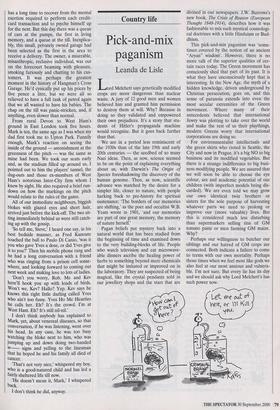Country life
Pick-and-mix paganism
Leanda de Lisle Lord Melehett says genetically modified crops are more dangerous than nuclear waste. A jury of 12 good men and women believed him and granted him permission to destroy them at will. Why? Because in doing so they validated and empowered their own prejudices. It's a story that stu- dents of Hitler's propaganda machine would recognise. But it goes back further than that.
'We are in a period less reminiscent of the 1930s than of the late 19th and early 20th centuries — the seedbed of so many Nazi ideas. Then, as now, science seemed to be on the point of explaining everything about us, with Darwin's The Origin of Species foreshadowing the discovery of the human genome. Then, as now, scientific advance was matched by the desire for a simpler life, closer to nature, with people harking back to pre-history for spiritual sustenance: 'The borders of our memories are shifting,' as the poet and occultist W.B. Yeats wrote in 1901, 'and our memories are part of one great memory, the memory of nature herself.'
Pagan beliefs put mystery back into a natural world that has been studied from the beginning of time and examined down to the very building-blocks of life. People who watch television and eat microwave- able dinners ascribe the healing power of herbs to something beyond mere chemicals that might be imitated or improved on in the laboratory. They are suspected of being magical, like the crystal pendants sold in our jewellery shops and the stars that are divined in our newspapers. J.W. Burrows's new book, The Crisis of Reason (European Thought 1848-1914), describes how it was fashionable to mix such mystical cosmologi- cal doctrines with a little Hinduism or Bud- dhism.
This pick-and-mix paganism was 'some- times covered by the notion of an ancient "Aryan" wisdom'. However, there is no more talk of the superior qualities of cer- tain races today. The Green movement has consciously shed that part of its past. It is what they have unconsciously kept that is interesting. In the New Age, the myth of a hidden knowledge, driven underground by Christian persecution, goes on, and this sense of paranoia extends into even the most secular extremities of the Green movement. Where many of their antecedents believed that international Jewry was plotting to take over the world and make the rest of us their playthings, modern Greens worry that international corporations are doing so.
For environmentalist intellectuals and the green shirts who rioted in Seattle, the City and now in Prague, it's a big NO to big business and its modified vegetables. But there is a strange indifference to big busi- ness modifying people. We are assured that we will soon be able to choose the eye colour, sex and academic potential of our children (with imperfect models being dis- carded). We are even told we may grow our own identical twin brothers or sisters for the sole purpose of harvesting whatever parts we need to prolong or improve our (more valuable) lives. But this is considered much less disturbing than supermarkets selling tins of GM tomato paste or men farming GM maize. Why?
Perhaps our willingness to butcher our siblings and our hatred of GM crops are connected. Both indicate a failure to come to terms with our own mortality. Perhaps those times when we feel most like gods we also feel at our most anxious and vulnera- ble. I'm not sure. But every lie has its day and we should ask why Lord Melchett's has such power now.


























































































 Previous page
Previous page